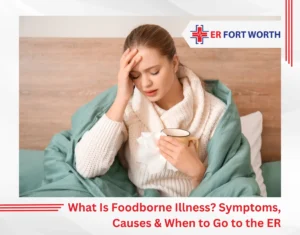A bloated stomach isn’t just uncomfortable. It can disrupt your sleep, affect your eating habits, and signal serious digestive issues that won’t resolve with basic diet changes.
Mild bloating is common and often resolves on its own. But finding the right bloated stomach treatment becomes crucial when symptoms persist, as this could indicate underlying health conditions that need medical attention.
This guide helps you understand the causes of bloating, what treatments work, and how to recognize warning signs that warrant an ER visit.
What Is a Bloated Stomach?

Stomach bloating is a feeling of fullness in your abdomen that often causes abdominal pain. It possibly occurs when your intestines hold excess gas. There are plenty of causes behind this condition. For some people, sugar seems to mess them up the most, while for others, bloating gets worse when stressed.
7 Common Causes of Stomach Bloating
A few common and complex causes for a bloated stomach include:
-
Gas
Gas is a natural part of digestion, but when too much gets trapped in your gut, it can lead to bloating and discomfort. Here’s why gas gets trapped instead of getting released:
- Swallowing Excess Air: You talk during meals and gulp air while eating or drinking. Chewing gum, sucking on hard candy, smoking, or wearing loose dentures can make you swallow more air than usual.
- Eating Gas-Producing Foods: Gas-producing foods include beans, potatoes, corn, onions, apples, carbonated drinks, processed meat, and other high-fiber options. However, not all these foods trigger stomach bloating in all individuals. The triggers vary from person to person.
-
Gluten and Celiac Disease
Celiac disease is a gastrointestinal (GI) condition that happens when your body can’t handle gluten (a protein in wheat, barley, and rye). Eating gluten damages your gut, causing bloating and pain. If you don’t have celiac disease but still feel bloated after eating bread or pasta, you might be sensitive to gluten or specific sugars in these foods.
-
Irritable bowel syndrome (IBS)
IBS is a widespread stomach issue with an unclear cause but may be related to an overly sensitive colon or immune system. Around 10% to 15% of adults in the U.S. have Irritable Bowel Syndrome (IBS). People with IBS often deal with stomach bloating.
-
Diabetic Gastroparesis (DG)
Diabetic gastroparesis is a condition caused by diabetes that affects stomach functioning. High blood sugar from diabetes can damage the nerves that control the stomach muscles, slowing or stopping the stomach’s ability to contract. These contractions help break down food and move it into the small intestine. Without these, food sits in the stomach and it doesn’t empty properly causing bloating.
-
SIBO (Small Intestinal Bacterial Overgrowth)
Your gut has bacteria to help digest food, but unnecessary bacteria build-up in your small intestine in SIBO. This condition makes digestion difficult and causes bloating.
-
Premenstrual Bloating
Premenstrual bloating is a common symptom of premenstrual syndrome (PMS) that happens before or during the period cycle due to hormone level changes.
-
Stress
Stress affects your nerves, which can slow down your intestines and make you feel bloated, nauseous, and tired.
Easy At-Home Treatment for Bloating Stomach

Here are a few things you can try to cure bloating at home:
- Diet: Eat smaller, more frequent meals, and chew your food well. Limit foods that are high in fermentable carbohydrates, salt and fat. How about keeping a food diary to keep track of your triggers? It’d help a lot to avoid foods that make your bloating worse.
- Hydration: Drink plenty of water to avoid constipation, which can lead to bloating.
- Lifestyle Changes: Regular exercise improves digestion and gets things moving in your gut. Make meditation a part of your daily routine. It reduces stress and bloating too. Avoiding food three hours before bed helps reduce nighttime bloating.
- Remedies: Massage your stomach from right to left to release trapped wind. Sit up straight after eating and take a walk. Consume peppermint tea as it soothes the stomach and helps release the gas buildup.
Warning: Always check with your doctor before trying any home remedies. Stomach bloating might seem harmless, but it could indicate a serious issue like appendicitis
When Does a Bloated Stomach Become an Emergency?
While bloating is often harmless, it can sometimes signal a more serious if it is accompanied by the following symptoms:
- Severe or persistent abdominal pain
- Nausea or vomiting
- Fever
- Difficulty passing gas or stool
- Heartburn
- Diarrhea
- Blood in stool
How Emergency Rooms Provide Relief for Bloating?

If your bloating won’t go away, the emergency room is your go-to place. Here’s how ER of Fort Worth can ensure gas and bloating relief:
-
Quick Diagnosis
To quickly find out the cause of your bloating, the doctors at the emergency room use the following tools:
- Ultrasounds
- X-rays of small intestine
- Blood test
- Urine analysis
- Fecal occult blood test (FOBT) or stool test
-
Instant Treatment
Once the doctor figures out what’s causing your stomach pain, they start treatment. Depending on the cause, you’ll get specific medication. If you’re dehydrated from vomiting or diarrhea, they likely treat you with IV fluids.
-
Specialized Care for Underlying Issues
If bloating is related to serious issues like chemotherapy they ease the side effects of treatment. For diabetes stomach bloating relief, they take your blood sugar under control, and so on.
Final Thoughts
Understanding what causes your bloating is the first step toward relief. While lifestyle changes often help, persistent symptoms may need immediate bloated stomach treatment. Don’t wait for symptoms to resolve on their own.
For severe or concerning symptoms, the Fort Worth emergency room provides prompt diagnosis and treatment. Listen to your body, and seek help when you need it.
Get Bloated Stomach Treatment in Fort Worth
FAQs: Bloat Stomach Treatment
-
What is the best treatment for a bloated stomach?
The best treatment depends on the cause of your bloating. Start with simple fixes for mild bloating: avoid trigger foods, drink plenty of water, and use over-the-counter medicines. If your bloating is more severe and doesn’t let up, it’s time to get professional help.
-
Can chemotherapy result in a bloated stomach?
Yes, chemotherapy treatments affect your digestive system and sometimes cause fluid buildup in your body, which can lead to bloating. Emergency rooms offer supportive treatments for stomach bloating, so you can stay comfortable while undergoing treatments.




